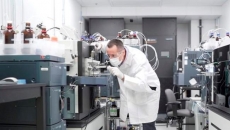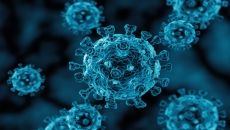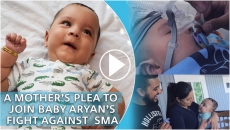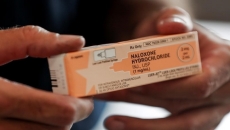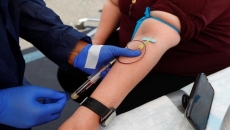The head of the Ontario Medical Association says the risk COVID-19 poses to pregnant and breastfeeding women is higher than the risk of taking a vaccine against the virus that causes it.
Dr. Samantha Hill, a cardiac surgeon in Toronto, says because pregnant and breastfeeding women haven't been included in clinical trials yet she is worried the message many pregnant women are getting is to not get vaccinated.
She echoes concerns raised last month by the Society of Obstetricians and Gynecologists of Canada, and reiterated in a statement from the Ontario Society of Obstetricians and Gynecologists Tuesday.
All say women who are pregnant or breastfeeding might be at higher risk of serious illness if they get COVID-19 and that particularly for women at high risk of exposure to the virus, the risks of not getting the vaccine outweigh the unknown risks of getting vaccinated.
Hill says she is still breastfeeding her youngest child and won't hesitate to get a vaccine when her turn comes, and also would get the vaccine if she were pregnant.
She says pregnancy already puts stress on the body's immune system and vascular system, and COVID-19 could pose great risk to a pregnant woman or her fetus.
"We don't have the choice of living in a COVID-free society," Hill said, in an interview with The Canadian Press. "We have the choice of accepting the risk of the vaccine, or accepting the risk of COVID and the risk of the vaccine certainly seems a lot lower to me than the risk of COVID."
Statistics suggest between eight and 11 per cent of pregnant women who contracted COVID-19 ended up in hospital, and between two and four per cent needed intensive care. That compares to about eight per cent of all COVID patients who have needed hospitalization and about 1.5 per cent who needed intensive care.
The national society of obstetricians says pregnant women with COVID-19 have an increased risk of needing to be placed on ventilators compared to other women of the same age, and that the risk of severe illness are greater for pregnant women who have other risk factors including asthma, obesity, non-pregnancy related diabetes, high blood pressure or heart disease.
Women are overrepresented in many of the occupations at highest risk of COVID-19 exposure including in health care.
The National Advisory Committee on Immunization in December recommended against giving the vaccine to populations who were not included in clinical trials unless the benefits of being vaccinated are deemed to outweigh the potential risk of the vaccine.
Hill says pregnant and breastfeeding women are never included in the clinical trials of new drugs or vaccines until the risks to non-pregnant individuals are known.
But she notes that 12 women who received the Pfizer-BioNTech vaccine during its large Phase 3 trial reported pregnancies during the trial and had no adverse outcomes from taking the vaccine.
The national society says the overall evidence for the vaccine and pregnancy is scant.
"What is known, however, is that an unvaccinated pregnant individual remains at risk of COVID-19 infection and remains at heightened risk of severe morbidity if infected compared to non-pregnant counterparts," the statement says. "Severe infection with COVID-19 carries risks to both maternal and fetal health"


